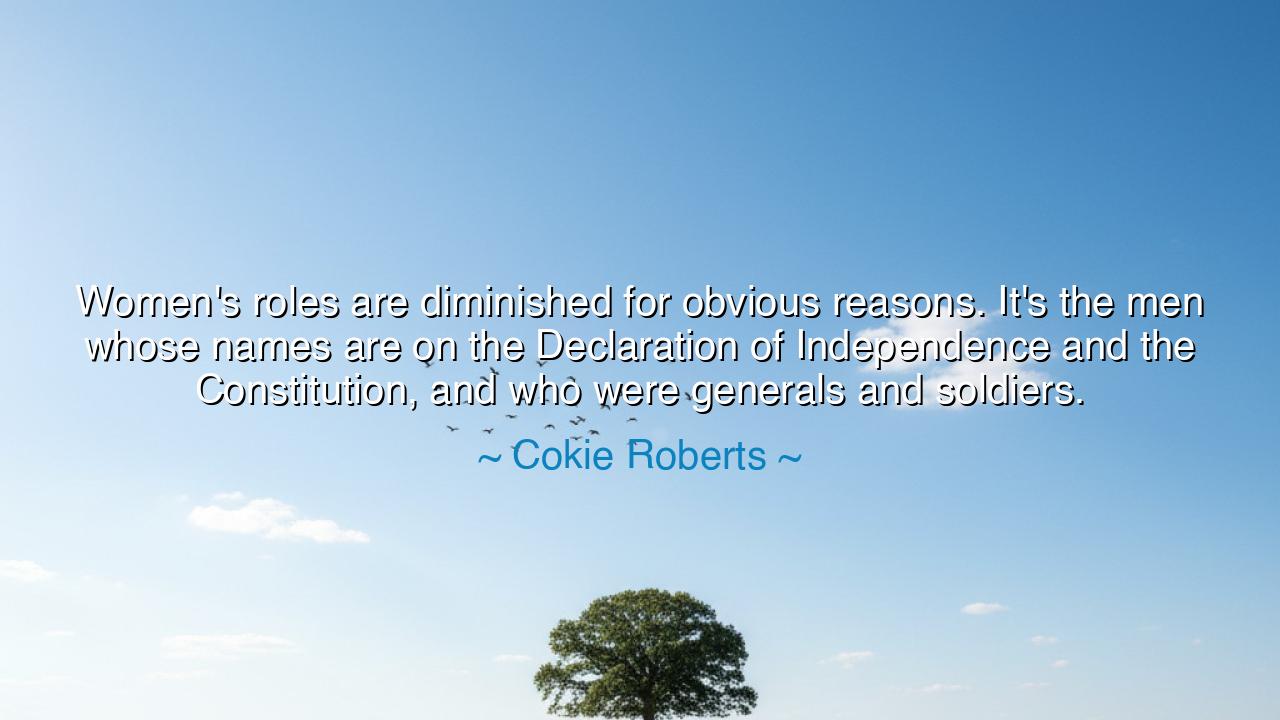
Women's roles are diminished for obvious reasons. It's the men
Women's roles are diminished for obvious reasons. It's the men whose names are on the Declaration of Independence and the Constitution, and who were generals and soldiers.






"Women's roles are diminished for obvious reasons. It's the men whose names are on the Declaration of Independence and the Constitution, and who were generals and soldiers." – Cokie Roberts
Hear, O seekers of truth, the voice of Cokie Roberts, a historian and daughter of patriots, who spoke not in anger, but in remembrance — reminding us that women’s roles, though often unseen in the written records of power, have shaped the very soul of civilization. Her words carry both sorrow and revelation: sorrow that history’s pages have so often favored the deeds of men; revelation that beyond those pages, in homes and hospitals, in farms and letters, in whispered prayers and unyielding labor, women built the foundations upon which nations stand.
The meaning of her words lies in the acknowledgment of an ancient injustice — not born from malice alone, but from the blindness of tradition. In the chronicles of history, it is the men’s names that appear — the generals who commanded armies, the statesmen who drafted the Declaration of Independence and the Constitution, the soldiers who marched beneath banners of freedom. But the absence of women’s signatures does not mark the absence of their influence. It is not that they were idle; it is that they were ignored. Their stories, though rarely carved in marble or inked upon parchment, were written in endurance, sacrifice, and love — the hidden script upon which the visible world depends.
The origin of this reflection lies in the work of Roberts herself, who sought to uncover the stories buried beneath centuries of omission. As a journalist and historian, she studied the birth of America and saw clearly that for every man who signed the Declaration, there was a woman who bore the cost of his courage. When the men went to war, women tended the fields, the wounded, and the children. They managed estates, preserved communities, and kept alive the very spirit of liberty the men fought to secure. Yet, when the victories were tallied, it was only the men’s names that history recorded. Thus, Roberts’ words are both lament and call — lament for what was forgotten, and call to remember that freedom has never been the work of one gender alone.
Let us remember the story of Abigail Adams, wife of John Adams, who wrote from her home in Massachusetts as her husband helped draft the new nation’s laws. “Remember the ladies,” she urged him, warning that if men continued to disregard women’s rights, “we will not hold ourselves bound by any laws in which we have no voice.” Her plea was prophetic — a voice of conscience echoing across the centuries. Yet her words were set aside, her wisdom noted but not acted upon. Still, her influence endured: her son, John Quincy Adams, would later fight against slavery, carrying within him the moral fire of his mother’s teaching. Thus we see that even when denied recognition, women’s power flowed unseen, shaping the future from behind the veil of silence.
Roberts’ words also reflect a deeper truth about how history is written. Those who wield the pen decide who is remembered, and for too long, the pen was held by men. The historian of old praised the soldier and the statesman, but forgot the healer, the teacher, the mother, and the rebel woman who dared to think beyond her age. Yet time, the great equalizer, now demands correction. Modern historians, inspired by voices like Roberts’, are lifting the veil, uncovering the heroines of old — Martha Washington, who held together the army’s morale; Sybil Ludington, who rode through the night to warn of invasion; Phillis Wheatley, the enslaved poet whose words celebrated freedom even before it was hers.
The lesson of this reflection is not merely to honor women of the past, but to see clearly in the present. Every generation inherits both the progress and the blindness of the one before it. The task of the wise is to continue uncovering the unseen — to give voice to those silenced by time or prejudice. Let the young learn that history is not complete until all its authors are known, and that greatness wears many faces, both crowned and humble.
So, O listener, remember this truth: independence and freedom were not the gift of men alone, but the shared labor of women and men alike. The signatures of the Founding Fathers may lie upon the parchment, but the spirit of the Founding Mothers lives in the heart of every generation that dares to rise. To remember them is not to diminish the heroes of history, but to complete their story. For a nation that forgets half its makers cannot truly know its soul. Let us, then, heed Cokie Roberts’ wisdom — to remember the invisible, honor the overlooked, and carry forward a history that belongs to all who built it.






AAdministratorAdministrator
Welcome, honored guests. Please leave a comment, we will respond soon